Are you a dead tree?
Chapter 13 of The Happiest Saddest People
When I look back to the beginning of 2019 I can see myself standing on the edge of a cliff. Things can’t continue as they have, but I also can’t see what might change. I feel exhausted and confused. The tree (me) is super dead. Right?
If you’re in a moment like this—dead faith, apathy, whatever—I hope this episode offers you hope.
Listen to Chapter 13 of The Happiest Saddest People here:
All the Things
We started the episode with a quote from Barbara Brown Taylor. That year she was on a promotion tour for her book, Learning to Walk in the Dark. Even at the time I had mixed feelings about it, but the soundbites are solid. If you’re looking for something great about seasons of spiritual darkness and their potential, I highly recommend The Dark Night of the Soul: A Deep Dive into the Shadow Side of Spirituality, Embracing Disorientation, Doubt, and Despair for Authentic Spiritual Growth and Wholeness. It’s written by a Christian psychiatrist and built upon the seminal Dark Night of the Soul by St John of the Cross (informed greatly by Saint Theresa).
During our time on staff at a church in Round Rock, Texas we twice had the wonderful opportunity to visit missionaries working in Zagreb, Croatia. Not all missionaries are the same, and these two (a husband and wife pair in later life) were high octane. From the moment our plane landed, Tom and Sandra had us put to work. Which was great. We led multi-day workshops for parents, married couples, and ministry leaders. We had meals with young ministers. We had four hour coffees with Tom and Sandra solving all the world’s problems. ;) But on each trip we grabbed the chance to get 24 hours away and visit what is probably our favorite town in the world—Rovinj. Because we’ve now lived in so many towns in so many places in the world, this is high praise. Rovinj is small, old, and perfect. Sailboats, gelato, cobblestone streets, great pizza, swimming spots everywhere. Here are a few pictures from our second trip there:
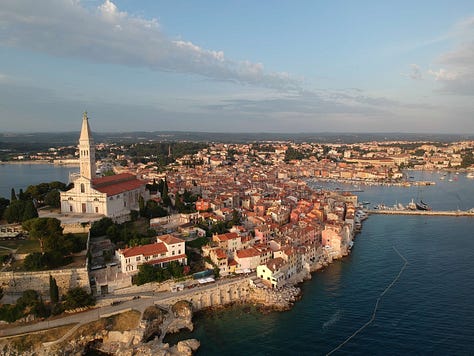
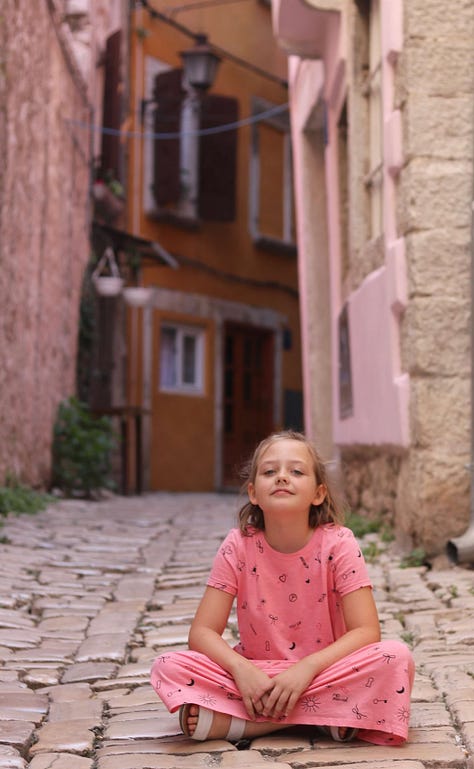
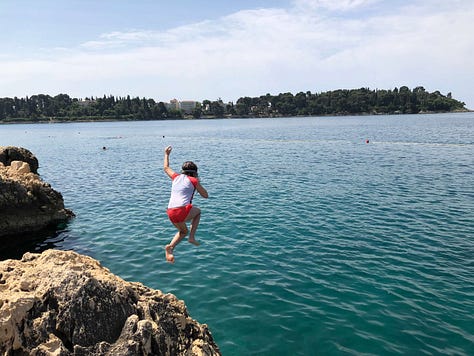
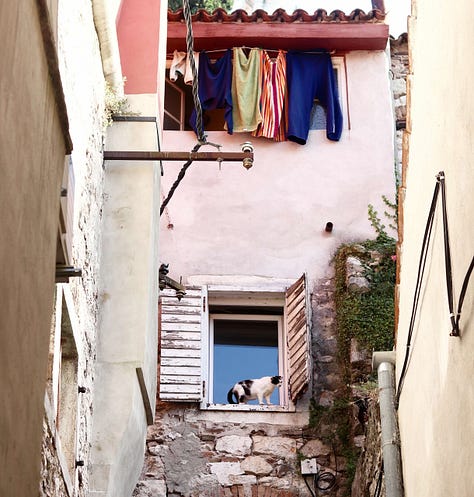

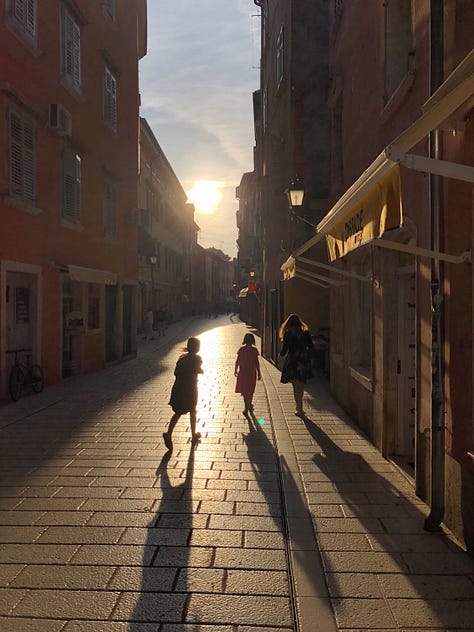
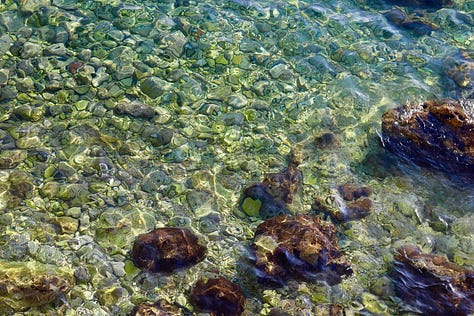
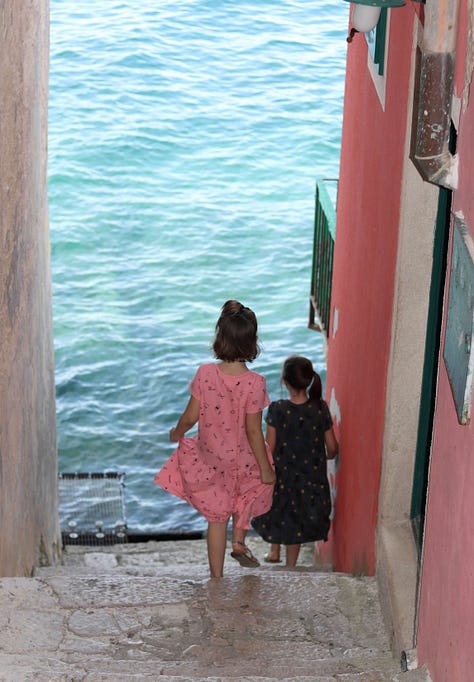
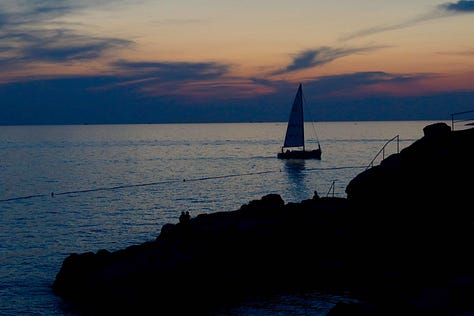
I wonder if this question hit you the way it hit me:
Why is everything good, fragile?
I’ve been reading some NT Wright and Mako Fujimura lately, and they are together upending my understanding of what’s fragile and what’s sturdy. Wright’s introduction to Fujimura’s book Art+Faith is an excellent look at the work of the artist and the perseverance of beauty.
Do you have a favorite season? Did you relate to the delineation between summer and winter Christians? When I wrote this bit about Winter, it surprised and convicted me:
Only hardy things survive the winter. You wear boots and stomp around and shiver. Most things are already dead. You can’t lose anything in winter; it’s all already gone, buried in the snow, fallen from the trees. In winter we hibernate and drink coffee and sigh. We do not desire. We do not dream. We do not dance. Winter is for the resigned.
Summer is for the naive. Or the hopeful. Or the brave.
Proof of the kayak and the blue hair:


That question from the women’s conference— “What do you think God’s making you into?”—it still haunts me sometimes. Here’s why I like it: It reminds me that God is making me into something. I am being purposefully handled and shaped. Here’s why I don’t like it: Most of the time you can’t know exactly what God’s plans are for you. He wants you to be Christ-like, sure. But beyond that, who knows? God’s plans are notoriously difficult to decipher. So instead of trying to decipher them, chill out and let Him work. You’ll know soon enough.
That line from Katherine May! Come on. It’s so beautiful.
“The tree is waiting,” writes Katherine May. “It will not burst into life in the spring. It will just put on a new coat.”
I haven’t been able to put it down since I read it five years ago. It’s from her excellent book, Wintering.
This line from the end of the episode had my whole family in tears:
The tree wasn’t dead. The spoon didn’t disappear. Bobby is alive. And Jesus is here.
I am finally learning object permanence.
The end-end of the episode has London blessing me late at night. We’re big on blessings in our family. I just wrote a piece about blessing and being blessed for the Substack, The Remarkable Ordinary, and this is how I defined a blessing:
What is a blessing anyway? The best way I know to explain is to say, it’s the opposite of a curse. It’s speaking words of life (not death), hope (not despair), light (not darkness) and victory (not defeat) over a person set apart by God to receive those very things. It’s a kind of echo of the first holy spell–Let there be...
Blessings create and order, direct and delineate. Blessings remind us who we are. Blessings remind us of what God’s promised. Blessings remind us that we walk through the world seen, loved, and protected. Being blessed is a little like being handed a map and a little like drinking a glass of cold water and a little like being defibrillated.
I hope this episode was a gift to you. For me, this feels like the moment when we begin to turn toward happiness. It’s time to up the saturation…
The Lord bless you and keep you.
To Be Continued,
JL


This podcast has meant so much to me. I lost a dear friend to cancer last summer, and hearing your words has been a balm. Thank you for your honesty and vulnerability and downright luminous writing!
Big fan of all this marginalia